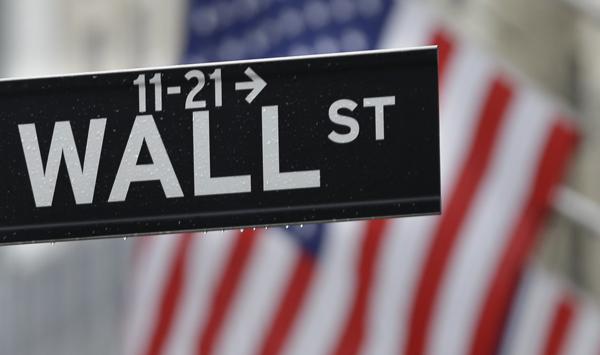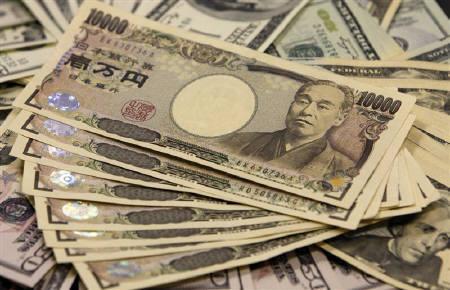You are here
Europe shares, oil snap four-day losing streaks
By Reuters - May 05,2016 - Last updated at May 05,2016

This July 9, 2015 photo shows a Wall Street sign near the New York Stock Exchange in New York (AP photo)
LONDON — European stocks and oil prices snapped a four-day losing streak and a rally in bond markets fizzled out on Thursday, as investors began to position themselves for US jobs data.
The pan-European FTSEurofirst 300 index, which had fallen 1.2 per cent to its lowest level in nearly a month in the previous session, rebounded 0.2 per cent as firmer oil prices helped the region’s big producers.
Wall Street was expected to start modestly higher too though trading was likely be low key given payrolls data on Friday, viewed as having the most direct influence on potential US interest rate moves.
There was a stark warning from Japan’s Prime Minister Shinzo Abe that the global economy could end up “plummeting into crisis”.
It came after Asian shares has seen a seventh straight day of falls overnight albeit tempered by relief that at least the yen appears to have stabilised having torn to an 18-month high this week.
Abe had said on Wednesday that Japan could act to weaken the yen if necessary. At the same time the dollar has been supported by optimism that the US economy could be finding some traction again having nearly stalling at the start of the year.
The dollar had climbed to 107.20 yen ahead of US trading, above the recent 18-month trough of 105.55 but a long way from last week’s peak of 111.88.
The euro changed hands at $1.1454, having been as high as $1.1614 this week from a low of $1.1213 in April. Against a basket of currencies the dollar was up 0.4 per cent at 93.573.
In commodity markets, industrial metals including copper and iron ore nursed more losses. Oil bounced as a huge wildfire in Canada disrupted oil sands production and escalating fighting in Libya threatened the North African nation’s output.
Brent crude was quoted 71 cents higher at $45.33 a barrel, while US crude added 89 cents to $44.67.
Bond markets had noticeably cooler feel, having seen one of their sharpest rallies of the year so far over the last week.
Yields on 10-year German Bunds and US Treasury notes hovered at 1.179 and 0.193 per cent, having both just hit their lowest in two weeks .
The gap between Italian and German government borrowing costs hit its widest level in nine weeks however, after Rome announced an unscheduled bond exchange and investors readied for a potentially sweaty series of political events in Europe.
Stalled talks between Greece and its international creditors over financial aid, as well as Spanish elections and Britain’s referendum on EU membership next month have led investors to reduce their exposure to riskier assets.
“We are cautious on the direction for the periphery and expect more volatility,” Mizuho strategist Antoine Bouvet said.
Talking Turkey
Turkish stocks fell and bond yields jumped after officials said overnight the ruling party was set to replace Prime Minister Ahmet Davutoglu at an extraordinary congress in coming weeks.
The decision came after a meeting of more than one-and-a-half hours between Davutoglu and President Tayyip Erdogan that followed weeks of public tension between the two men.
The lira then bounced over 2 per cent to 2.8975 per dollar in volatile deals in Istanbul as Davutoglu called for the ruling AKP Party to remain “strong”. That was preceded by a three-day pounding that was one of its worst in decades.
“The political environment is very unpredictable, and this will certainly have negative repercussions for Turkey’s risk premium, financial volatility and macroeconomic outlook,” Finansbank said in a note.
The seventh straight dip for Asian shares overnight followed mixed economic data that did nothing to assuage concerns about global growth.
The latest survey from China showed the service sector expanded at a slower pace in April, though firms did resume adding staff.
The Caixin/Markit services purchasing managers’ index (PMI) dropped to 51.8, from 52.2 in March, but at least stayed in growth territory. Hong Kong’s version of the PMI slid into a deeper contraction to touch an eight-month low.
The patchy outcomes left Shanghai stocks flat while trade across the region was stifled by a holiday in Japan.
MSCI’s broadest index of Asia-Pacific shares outside Japan eased 0.3 per cent, and has now shed 5 per cent in just two weeks.
Wall Street also slipped amid mixed data. The vast US services sector expanded in April as new orders and employment accelerated, offering hope that economic growth would rebound after a sluggish first quarter.
But other figures showed private employers hired the fewest workers in three years, sparking concerns the payrolls report might also disappoint. Friday’s jobs figures are forecast to show a solid gain of 202,000 in April with unemployment steady at 5 per cent.
“I think what has taken place more than anything else over the past 48 hours is the questioning of the reflation trade that was starting to be latched on by many, especially when you consider the recent price action in the USD, commodities and equities,” CitiFX analysts said in a note.
Related Articles
NEW YORK — World stock indexes and commodities dropped on Tuesday as weak Chinese data revived fears about the effect of China’s economic he
TOKYO — Tokyo stocks rose more than two per cent in early trade Thursday, supported by a cheaper yen following the US Federal Reserve's rate
NEW YORK — The dollar jumped against the yen on Tuesday, after the Bank of Japan (BOJ) said it intends to keep rates low for an “extended pe
















